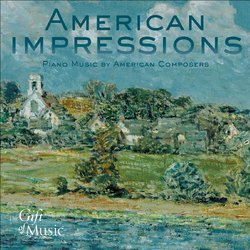| All Artists: The Westphalian Symphony Orchestra;Edward Macdowell;Martin Souter Title: American Impressions Members Wishing: 0 Total Copies: 0 Label: The Gift of Music Release Date: 3/4/2005 Genre: Classical Styles: Forms & Genres, Concertos, Suites, Symphonies Number of Discs: 1 SwapaCD Credits: 1 UPC: 658592114324 |
Search - The Westphalian Symphony Orchestra;Edward Macdowell;Martin Souter :: American Impressions
 | The Westphalian Symphony Orchestra;Edward Macdowell;Martin Souter American Impressions Genre: Classical
American Impressions Piano Music by American composers Contrasting music rooted, like American painting of the late nineteenth century, in the European and American traditions: Charles Griffes was the first American "Impre... more » |
Larger Image |
CD Details
Synopsis
Product Description
American Impressions Piano Music by American composers Contrasting music rooted, like American painting of the late nineteenth century, in the European and American traditions: Charles Griffes was the first American "Impressionist" composer. Edward Macdowell took the American landscape and scenes as his inspiration. Both studied in Europe before returning to their native land to begin distinctive musical careers as American composers. Charles Tomlinson Griffes was one of the earliest American composers to develop a distinctive American sound, despite his immersion in the European tradition, which even included study in Leipzig, and his friendships with great European musical figures of the day such as Richard Strauss and Ferrucio Busoni. Their avant-garde orchestrations and harmonies within fairly conventional musical structures clearly made a mark on Griffes. His beautiful piano compositions - often described as the first American Impressionist music - combine unusual harmonies with melodies which are surprisingly conventional in structure. His Roman Sketches are amongst his best-known compositions, and The white peacock is justly famous for its stunning, intense opening few bars. The composer of the gorgeous, perfectly crafted Woodland Sketches is Edward Macdowell. Macdowell was born in 1860 in New York. He studied in Europe, of course, and his music owes more to the Norwegian composer Grieg and to the Bohemian Dvorak than to any specifically American influence. He was part of an individual line of composers who quite specifically went to Europe to study, and then returned to America to impart and develop their carefully honed musical techniques which they had acquired in Leipzig, Berlin or Paris. Many of them fitted in to the group of composers we now call the Boston Classicists; possibly George Chadwick and Horatio Parker are the most famous of them today. They were all particularly good at composing songs - in the European lieder tradition of Schumann and Brahms - and their music is never less than well-written and pleasant to listen to. Edward Macdowell fitted in with this group's aims and styles, but was head and shoulders above them all as a musician. He was lionised during his own lifetime, rather like Elgar was treated in England during the same period. Both were seen by their own public as great hopes for the role of a national composer of international significance. In England the hero-worship of Elgar remained for many years, in fact it's never really disappeared, whereas, in New England, Macdowell was all but forgotten almost from the moment he died. Only recently has his music been rediscovered. And it is lovely music. Most of the pieces which make up Woodland Sketches have titles with either direct American associations, such as From an Indian Lodge or From Uncle Remus, while the others have titles which can be interpreted as evocations of an American landscape, the scenery of Emerson, or Mark Twain. Macdowell's Piano Concerto is a masterpiece of the Romantic period. It has echoes of Liszt, or even Tchaikovsky, while the first few bars of orchestral introduction could, in another context, be the start of an atmospheric opera overture. After the bravura of the entry of the piano, Macdowell follows with a most beautiful melody, and the movement continues to alternate between the calm of the orchestra and the near frenzy of the piano textures. The second movement scherzo could almost be Brahms at his most cheerful, while the slow movement and finale echo Macdowell's techniques of the opening movement, alternating piano and orchestra in hugely effective writing.

 Track Listings (18) - Disc #1
Track Listings (18) - Disc #1